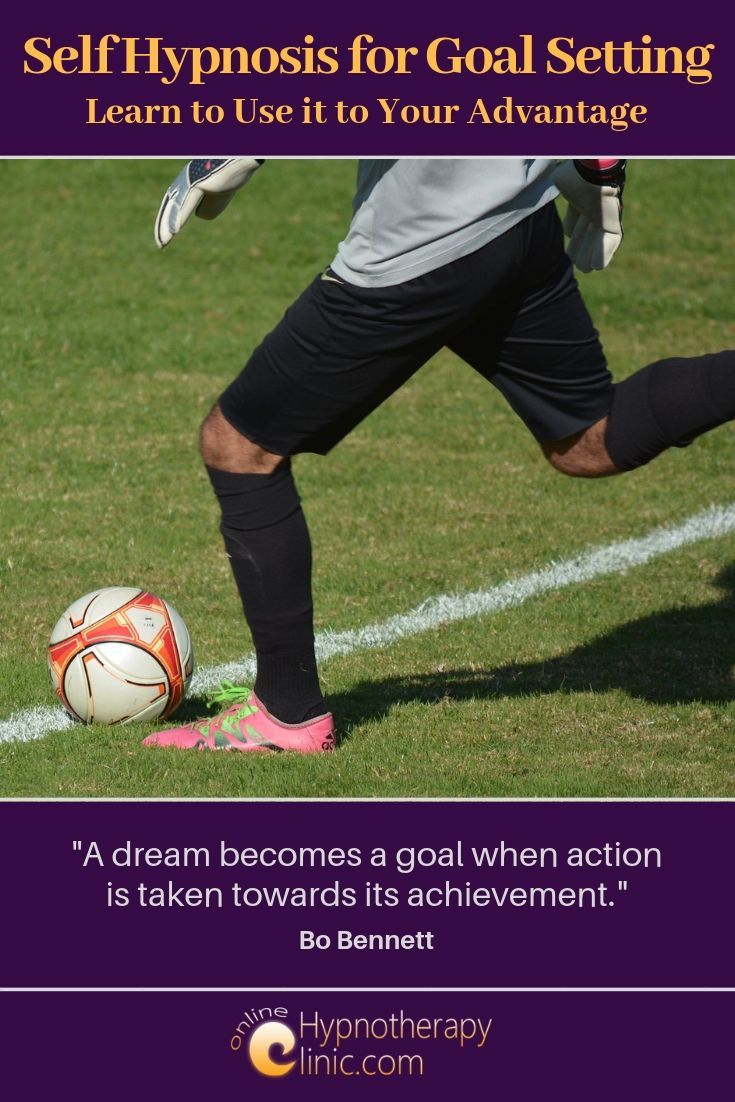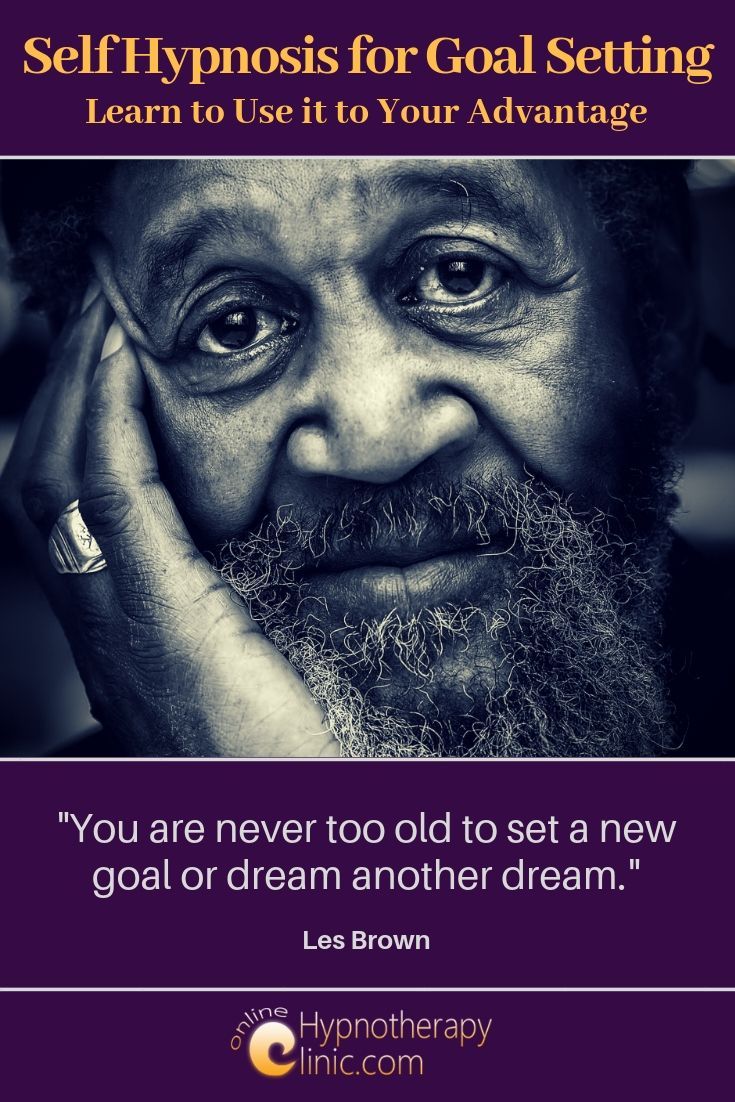Self Hypnosis for Goal Setting- Learn to Use it to Your Advantage
By Susanna Sweeney, MSC, MBACP, CHT
Using self hypnosis for goal setting, you will learn how to avoid the 7 most common mistakes in conventional thinking around how to set goals so that you can set your goals correctly and will succeed. I will show you how to change your mindset around goal setting using an approach informed by hypnosis.
Why Self Hypnosis for Goal Setting ?
The prime example for how difficult it can be for people to set and achieve goals in life without harnessing the subconscious mind is found in New Year’s resolutions.
Remember the time you
decided lose weight or to give up smoking for New Year’s? I bet those
plans came apart within a couple of weeks. For most people they do.
This is where self hypnosis for goal setting comes in- it really makes a difference, helping you navigate the obstacles and limitations your mind sets for you. Let's talk about the 7 most common mistakes in conventional thinking around goal setting, and I will show you how applying thinking based on self hypnosis will put you ahead of the posse.
The 7 Most Common Mistakes in Goal Setting and How to Dismantle Them
1. Believing that all it Takes is to set a Goal
Making a change is not just a conscious decision.
Remember, the conscious mind makes up only 10-20 percent of our overall brain power.
The rest is dominated by the subconscious mind. If you want to achieve permanent change, you have to harness your subconscious mind power.
The subconscious mind is where emotions, desires and habits live. Believe it or not, these are so much stronger than conscious thought when it comes to decision making. And unless you teach yourself to change these, achieving your goal will be a struggle of willpower.
Hypnosis for goal setting therefore requires dismantling some subconscious mind programming- in as far as the old programming is holding you back from realizing your goal.
2. Setting Vague Goals
Setting vague goals ends up in vague or no results. “I am going to cut down my smoking.” is a vague goal. Your subconscious mind won't know what you want it to do.
When do you want to stop smoking? Make sure to be specific.
If you want to appeal to your subconscious mind, you must speak its language. And the language of the subconscious mind is specific.
“I am going to cut down by one cigarette each day starting today and I will quit smoking by March 1st.” This is a specific goal which contains an action step for each day. Taken together, these action steps spread over a space of time will help you achieve a major goal.
So, make sure you set specific goals, and ideally include concrete action steps.
3. Demanding too Much Change at Once
It’s really easy to become over enthusiastic and set your goals so high that you set yourself up for failure.
It’s best to change only one thing at a time.
For example, many people want to quit smoking without gaining weight.
For such double goals, my suggestion is to break them down into single components which are easier for the subconscious mind to handle.
In the case of weight concerns while quitting cigarettes, my suggestion is focus on quitting smoking first, while stabilizing your weight. Do not attempt to lose weight at the same time as giving up tobacco because you can easily confuse your subconscious that way.
Your subconscious mind is not great at multi tasking, but is excellent at zooming in on one particular issue and focusing all energy on that. So, stick to one goal at a time. You can set another goal once you have achieved the first one. Take it one step at a time.
4. All-Or-Nothing Thinking
If you are like most people you will think of change in your life in either-or-terms. It’s either success or it is failure.
In my opinion, not a good concept. Why?
At the first perceived failure people usually give up. Why?
Perceived failure produces negative emotions such as shame and disappointment.
But self hypnosis thrives on positive emotion.
Change your mind set and accept that in reality, achieving lasting change is always a journey. It’s a journey of ups and down, trials and tribulations, until the change you want to make becomes permanent. So called failures are part of this journey.
Think of the journey this way: Every ‘failure’ offers precious learning.
Therefore, when you make a mistake or 'fall off the wagon', just get back on as if the glitch never happened at all, and continue on your journey towards your goal.
Your subconscious mind will thank you and will help you to never give up, as long as you keep your emotions positive.
5. Dwelling on Negative Emotions
I have already talked about how all-or-nothing thinking that
leads to perceived ‘failures’ and often winds up in negative emotions.
But the warning about negative emotions stretches beyond that. Many people continually judge themselves, often without being consciously aware they are doing this. Beware of your inner dialogue when you find yourself thinking things such as:
- “I’ll never get it right.”
- “I am just not good at this.”
- “I just can’t do this.”
- “I will just have to put up with being overweight.”
- “I just have an addictive personality and that’s it.”
Once
you judge yourself, the door is wide open for negative emotions.
Self-blame leads to shame, fear and anger.
These emotions in turn lead
to your system shutting down and preserving the status quo.
The
subconscious mind, if it is to embrace change, likes positive emotion to
be associated with the change. You must support yourself in maintaining a positive attitude throughout to be able to achieve your goal.
Using thinking based on self-hypnosis for goal setting will help you with that.
Tips on self hypnosis for goal setting:
Mind power techniques for mastering your emotions can help you nurture positive emotions and put negative emotions in their place.
Use auto suggestions to boost positive emotions and to regularly remind your subconscious mind of your (specific) goal.
Use auto suggestion techniques to formulate your auto suggestions correctly so that they will work for you and not against you.
6. Believing Negative Subconscious Programming
We tend to believe that our conscious mind, which we experience during day time hours, is all there is to ourselves.
We like to think of ourselves as perfectly rational and we like to believe that every decision we make is based on rational thought.
There is a lot of research on psychological phenomena that shows that nothing could be further from the truth.
One good example is research on
different types of psychological biases that we use unconsciously as short cuts in
decision making. Here, research has shown that decisions tend to be much
more irrational than they are rational.
In reality, we are much more likely to make
decisions based on emotional experiences in the moment. Then we
justify them later with rational thought.
In hypnosis, the model we use
describes the rational mind as making up no more than 10 to 20 percent
of our brainpower, the rest being run by the subconscious.
The problem is, we tend to ignore our subconscious. We tend to deny it exists at all. Some people are even afraid of it. That means ignoring and neglecting 80 to 90% of our brainpower.
And
the more you ignore the subconscious, the more it is left to its own
devices, running whatever programs it sees fit. This subconscious mind programming runs in
the background while you are going about your daily life, while you are
asleep at night. These programs are running whether you are
aware of them or not. Read more about how this plays out on a daily basis in my article: "Does Self Hypnosis Work?"
Often, these programs are based on
negative experiences in childhood that people had to get through
somehow. And while these programs may have been helpful for survival back then, more
often than not, they are no longer helpful now.
For example, a
child may have been criticized a lot by her parents while growing up. In
order to get through this painful, shame instilling experience, she
told herself that her parents were right, that she was at fault and not
good enough.
In adulthood this survival strategy becomes a
limiting belief that holds her back. Every time she encounters a
challenge the old program will play in the background:
- “But you are not good enough.
- You will get it wrong.
- You usually make mistakes.
- You usually fail.”
And what you believe you are, that is what you will be.
Therefore, she will inevitably set herself up for failure with whatever she attempts to do.
Once that failure (or perceived failure) happens, the old feelings of shame and inadequacy will replay themselves for her. She will feel bad about herself, and those feelings feel very real and very familiar.
Therefore she will allow them to reinforce the false negative belief that she is “no good”.
This cycle will continue for as long as she believes that the negative belief is real.
To fully experience the benefits of self-hypnosis you must become aware of these limiting beliefs and see them for what they are- an illusion. You can include auto suggestions to this effect in your program of self hypnosis for goal setting.
7. Not Having the Right Tools to Hand
Once you have set your goals the right way, you need to use the right tools to help you achieve them. Without the right tool box you can easily get lost.
Self hypnosis techniques help you convince your subconscious mind to come on board with the changes you are planning to make. These tools speak the language of the subconscious mind and introduce suggestions of change in a compelling way that evokes positive emotions and keeps your desire burning for realizing your goal. The benefits of self-hypnosis include helping you to convince your subconscious mind that change is desirable.
What is Hypnosis? Other Articles on This Topic
Understand the Basics
Discover the Power of Hypnosis
Discover the power of hypnosis through 10 amazing facts about hypnosis you most likely have not heard before.
Six Wonderful Benefits of Hypnosis for Creating the Life you Love
Find out the benefits of hypnosis over coaching and traditional talk psychotherapy in helping you change your life for the better and achieving your goals.
You may have heard anecdotal reports about hypnosis being nothing more than unscientific ‘mumbo-jumbo’ which might have planted this question in your mind. So, does hypnotherapy work? Find out my answer to this charged question, and it probably isn't what you would expect.
The 3 Worst Mistakes Hypnotists Make
Find out the three worst mistakes any hypnotist can make so that you can avoid them and find the right hypnotist for you.
Evolution has given humans a powerful tool that enables us to be the most dominant species on the planet- yet this tool contains a critical flaw that is limiting many people and preventing them from living their dream. This may be limiting you, too...
The Secret Language of Hypnotherapy
Learn the secret language of hypnotherapy geared towards the requirements of your subconscious mind so that you can reach your goals more easily.
Find out the most common issues that hypnosis can help you with and see what you could do with hypnosis to change your life.
This article is a great starting point to understanding what to expect from hypnotherapy treatment, including what you can do to get the most from your treatment.
Hypnosis has been shrouded in mystery. There are many myths or, simply, false beliefs attached to hypnosis. You, too, have likely picked up a few of them as they are ‘around’ in public consciousness. Let me bust those myths for you so you can be free to enjoy and appreciate hypnosis for what it is.
Hypnosis or Self Hypnosis Trance
Hypnotic trance is referred to with much mystery. Is it really that spooky? Allow me to talk you through what the experience is like.
Hypnosis Methods and Ways of Working
This article covers everything you want to know about suggestion hypnosis, including what it is, what it can do for you, how it works, what techniques are used and how you can get the very best out of it. Suggestion hypnosis can help you to reach your goals and change your life.
Regression Hypnosis can help you to clear blocks relating to the past which are causing you trouble now. Find out how it works, how it compares to coaching and psychotherapy and see if it is suitable for you.
This article fills you in on how you can get the very best from regression hypnosis and is a must read if you are thinking of embarking on hypnotherapy treatment for a complex personal issue.
Some hypnotists offer specific sessions to uncover past life memories. Is this a good idea? Find out what my thinking is on how to get the best results from past life hypnosis.
Does online hypnotherapy work or is it inferior to face to face work as some people say? Find out what's involved and form your own opinion about advantages and disadvantages working online with us.
What is Havening and how Can it Help you Change Your Life?
Find out about a novel psychosensory treatment we combine with hypnosis which can help you clear trauma, fears, phobias, anxiety, low self esteem and more while also supporting you in building resilience and positive emotions.
Discover how well hypnosis could work for changing your particular bad habit and how you can make it into a starting point for changing your life.
Hypnosis for Permanent Rapid Change
No more scripts. The new way to work with live issues. It's dynamic, fast, gentle and powerful.
Self Help Hypnosis Articles
Can you help yourself with hypnosis? Find out here...
You will find this question answered but in a way you probably would not expect. Find out how self hypnosis is always at work, whether you harness it as a skill or not...
The Benefits of Self Hypnosis
Find out in this article how you can benefit from self hypnosis in your life, including what issues you can use it for.
Self-Hypnosis Relaxation Techniques
A good place to start practicing self hypnosis techniques first before infusing them with images regarding your specific goals, or changes that you want to make in your life is with relaxation techniques. Find a sample relaxation script on this page that you can start using today.
Self Hypnosis for Goal Setting
Goal setting is key in working with personal goals. If you don’t get your goals just right, you are much less likely to get good results. Find out how to overcome the seven most common mistakes with goal setting when you use a self hypnosis based approach.
Self-Help Hypnosis- 7 Challenges and How to Overcome Them
Like any other form of therapy, self-help hypnosis, too has some limitations which you should be aware of before you start practicing. I also offer some practical tips and solutions to help you overcome most of these limitations.
Auto Suggestions
In this article, find out the history of auto suggestions, the science behind them and how you can use them to your advantage to change your life.
In this article, find detailed instructions on how to design, administer and troubleshoot your auto suggestions successfully so that you can use them to change your life.
Mind Power Techniques for Success
- Mastering your Mind Power: Find out why mastering your mind power is crucial when you want to become successful, and how you can get started.
- Mind Power Techniques to Help You Solve any Problem: Solve any problem with my easy-to-learn mind power techniques for problem solving- problems big or small, exceptional or everyday.
- Mind Power Techniques for Mastering Your Emotions: Boost your success by learning to master your emotions so that your energy is free to focus on your success in life. Follow my comprehensive guide which includes 9 powerful exercises that will teach you mind power techniques for mastering your emotions.
- Mastering Your Subconscious Mind Power for Success: If you want to harness your subconscious mind power and use it to become your partner in achieving success, you are putting yourself on a journey of massive personal growth. This article is a comprehensive guide designed to talk you through the most important strategies you must learn first in this process.
- Mind Power Study Techniques to Put You Ahead of the Posse: Find my comprehensive mind power study tips and techniques to help you put your energy for study to optimum use.
I hope this article on how to use an approach informed by hypnosis for goal setting has helped you to become clear on how to build good foundations for your work with hypnosis for goal setting. I hope the article will make an active difference in helping you change your life for the better.
In the comments underneath, let our community know how you are getting on.
Regards,

Recent Articles
-
Havening Technique Training auf Deutsch
Apr 18, 25 02:59 AM
Havening Technique Training auf Deutsch- Details und Buchung -
Client Testimonials
Oct 06, 23 06:08 AM
Client Testimonials of my Online REPAIRenting® Program that uses various psychosensory approaches for safe and quick transformation -
Smoke Free Thanks to This Amazing Resource
Aug 02, 23 09:26 AM
Oh thank you for this simple resolution to all my worries! I feel like I have had a weight lifted off my shoulders. It is like cheating on giving up smoking.





New! Comments
What do you think? Leave a comment in the box below.